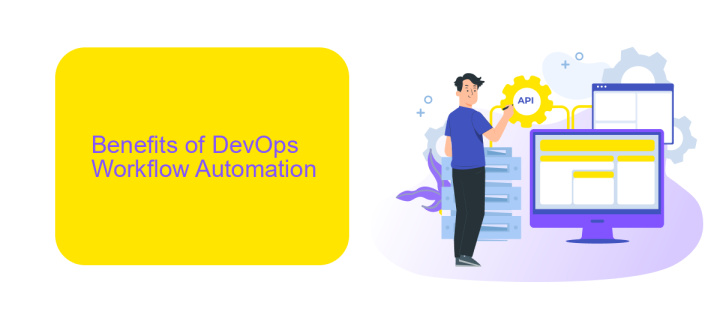DevOps Workflow Automation
In today's fast-paced tech landscape, DevOps workflow automation has become essential for streamlining processes and enhancing productivity. By automating repetitive tasks, teams can focus on innovation and quality, reducing errors and accelerating delivery times. This article explores the key components, benefits, and tools of DevOps workflow automation, providing insights into how organizations can leverage automation to achieve seamless, efficient operations.
Introduction
In today's fast-paced technological landscape, DevOps workflow automation has emerged as a critical component for enhancing efficiency and ensuring seamless operations. By automating repetitive tasks, organizations can significantly reduce human error, accelerate deployment processes, and improve overall productivity. This transformation is not just about adopting new tools, but also about fostering a culture of continuous improvement and collaboration between development and operations teams.
- Accelerated deployment cycles
- Reduced human error
- Enhanced collaboration between teams
- Improved scalability and reliability
One of the key aspects of achieving effective DevOps workflow automation is the integration of various tools and services. Platforms like ApiX-Drive facilitate this by allowing seamless integrations between different systems, thereby streamlining processes and reducing manual intervention. By leveraging such solutions, organizations can ensure that their DevOps practices are not only efficient but also scalable and adaptable to future technological advancements.
Benefits of DevOps Workflow Automation

Automating DevOps workflows offers significant benefits, including increased efficiency and reduced human error. By automating repetitive tasks, teams can focus on more strategic activities, leading to faster deployment cycles and improved productivity. Automation tools streamline processes such as code integration, testing, and deployment, ensuring that these tasks are performed consistently and accurately every time. This consistency reduces the likelihood of errors that can occur with manual processes, enhancing overall system reliability and stability.
Moreover, DevOps workflow automation facilitates better collaboration and communication among team members. Tools like ApiX-Drive help in setting up seamless integrations between various services, enabling real-time data synchronization and reducing the complexity of managing multiple systems. This integration capability ensures that all team members have access to the most up-to-date information, fostering a more cohesive and efficient working environment. Ultimately, the automation of DevOps workflows leads to faster delivery of high-quality software, giving organizations a competitive edge in the market.
Key Considerations for Implementing DevOps Workflow Automation

Implementing DevOps workflow automation requires careful consideration of several key factors to ensure a seamless and efficient process. These considerations help in maximizing the benefits of automation while minimizing potential challenges.
- Tool Selection: Choose tools that align with your existing infrastructure and can be easily integrated. Tools like ApiX-Drive can facilitate seamless integration between various systems and services.
- Scalability: Ensure that the automation tools and processes you implement can scale with your organization’s growth and evolving needs.
- Security: Incorporate robust security measures to protect sensitive data and maintain compliance with industry standards.
- Monitoring and Logging: Implement comprehensive monitoring and logging to quickly identify and resolve issues, ensuring continuous improvement.
- Team Training: Provide adequate training for your team to effectively use and manage the automation tools and processes.
By carefully considering these factors, organizations can successfully implement DevOps workflow automation, leading to improved efficiency, faster deployment times, and enhanced collaboration across teams. Proper planning and execution are crucial to reaping the full benefits of automation in a DevOps environment.
Tools and Technologies for DevOps Workflow Automation

DevOps workflow automation is essential for enhancing efficiency and ensuring seamless integration between various stages of the software development lifecycle. By leveraging the right tools and technologies, teams can automate repetitive tasks, streamline processes, and improve collaboration.
Several tools and technologies are pivotal in achieving effective DevOps workflow automation. These tools help in continuous integration, continuous delivery, infrastructure as code, and monitoring.
- Jenkins: An open-source automation server for continuous integration and delivery.
- Docker: A platform for containerization, enabling consistent environments across development and production.
- Kubernetes: An orchestration tool for managing containerized applications at scale.
- Ansible: An automation tool for configuration management, application deployment, and task automation.
- ApiX-Drive: A service for setting up integrations and automating data transfer between applications without coding.
By integrating these tools into the DevOps workflow, teams can achieve faster deployment cycles, reduce human error, and maintain a high level of consistency across different environments. ApiX-Drive, in particular, simplifies the process of connecting various services, ensuring smooth data flow and integration without the need for extensive coding knowledge.
Best Practices for Implementing DevOps Workflow Automation
Implementing DevOps workflow automation requires a strategic approach to ensure efficiency and scalability. Begin by clearly defining your objectives and identifying repetitive tasks that can benefit from automation. Utilize tools that integrate seamlessly with your existing infrastructure to minimize disruptions. Regularly monitor and update your automation scripts to adapt to evolving requirements and prevent potential issues. Additionally, establish a robust version control system to track changes and maintain consistency across your workflows.
Effective communication and collaboration among team members are crucial for successful DevOps automation. Encourage a culture of continuous improvement and knowledge sharing to foster innovation. Leverage integration services like ApiX-Drive to streamline data flows between various applications, reducing manual intervention and enhancing productivity. Conduct regular audits and performance reviews to identify bottlenecks and optimize your processes. By adhering to these best practices, you can achieve a more agile, responsive, and reliable DevOps environment.


FAQ
What is DevOps Workflow Automation?
Why is DevOps Workflow Automation important?
How can I get started with DevOps Workflow Automation?
What are some common use cases for DevOps Workflow Automation?
How does DevOps Workflow Automation improve collaboration within teams?
Strive to take your business to the next level, achieve your goals faster and more efficiently? Apix-Drive is your reliable assistant for these tasks. An online service and application connector will help you automate key business processes and get rid of the routine. You and your employees will free up time for important core tasks. Try Apix-Drive features for free to see the effectiveness of the online connector for yourself.

